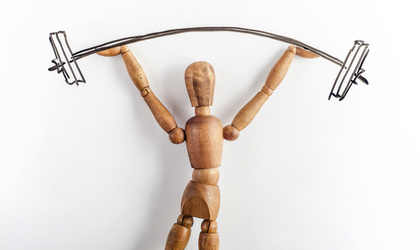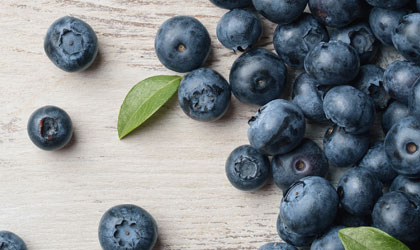
The food you eat doesn’t only deliver a delicious dopamine hit and a full belly; it affects every single part of your body – bones and all. In the same way you might eat to lose weight, lower blood pressure, and improve cardiac function, you can also tailor your nutrition to support bone health. Contrary to everything you were taught as a child, nourishing bones asks more of you than simply chomping down on cheese and glugging glasses of milk. In truth, you need a host of nutrients to keep this vitally important part of your anatomy functioning optimally.
Pack in protein
Beyond making up 50% of your bone composition, protein is also known to support calcium absorption and maintain bone mass. In a six-year observational study of 144,000 postmenopausal women, higher protein intake was associated with a decreased risk of forearm fractures, along with considerably better bone density in the spine, hip, and total bodyi. Optimal protein intake, therefore, is imperative for bone health. Where possible, try to include one serving of protein with every meal. (Added bonus: protein is enormously satiating, so you’ll feel full for longer, too!) Lean meat, poultry, fish, and eggs are all rich sources of animal-based protein. Vegetarian or vegan? Tofu, tempeh, lentils, beans, quinoa, oats, and chia seeds are also crammed with bone-bolstering protein. Top tip: combine legumes with whole grains to form a ‘complete’ protein, which contains full-spectrum of essential amino acids.
Chow down on calcium
The rumours are true: calcium is brilliant bone food. Primarily stored in bones, calcium is by far the most common mineral in the human body. Not only is it essential for sustaining bone mass and supporting your skeleton, but it’s also needed for a raft of other roles, including muscle, nerve, and heart function. If there’s a dearth of calcium in your diet, it will be leached from your bones, weakening them and increasing the risk of fracture. In one study, poor calcium intake was directly related to low bone mass densityii. Just because cheese is jam-packed with calcium doesn’t mean you have permission to indulge to excess (the extra weight certainly won’t help your joints!). Sure – milk, yoghurt and cheese pack powerful calcium punches, but so do dark leafy green veggies (kale, broccoli, and spinach), canned fish (salmon, sardines, and tuna), almonds, seeds, beans, and lentils. You should aim for 700mg calcium every day.
Say hello to the ‘sunshine nutrient’, vitamin D
Like calcium, vitamin D is famous for its bone-supporting prowess. These potent nutrients work together to keep your bones strong and sturdy: calcium maintains and builds bone density, while vitamin D aids with the absorption of calcium. Simply put, your calcium and vitamin D intake must be healthy and adequate to fully realise the impact of each nutrient on your bones. So, even if you focus all your attention on eating more calcium – and failing to consume enough vitamin D – all that calcium goodness will essentially go to waste. What a shame! Indeed, studies highlight adults with poor vitamin D stores are more likely to have lower bone density and an increased risk of bone loss than those who get enoughiii. The best way to reap vitamin D’s bone-loving benefits is through moderate exposure to sunlight. When sunlight hits your skin, your body synthesizes vitamin D3. But, as every Brit knows, the sun rarely shows its face between October to early April, making it the perfect time to cram more vitamin-D rich food into your diet. Natural sources include oily fish (salmon, trout, mackerel, and herring), some pork products, lamb’s liver, eggs, mushrooms, and fortified foods like orange juice, breads, and milk. If you can’t meet the RDA of 10mcg, you may want to think about supplementing with vitamin D supplement, which comes highly recommended by Public Health England and the NHSiv.
Vitamin A-OK
It’s possible you aren’t fully acquainted with vitamin K2 yet. Let us introduce you: vitamin K2 is a powerful weapon for bone health, playing a vital role in bone formation, strengthening bones, and maintaining calcium homeostasis in the body. Clinical studies consistently point to vitamin K’s bone-supporting credentialsv. You can find vitamin K2 buried in yoghurt, fermented foods, and ripe cheese. Generally speaking, adults need 1mcg (microgram) of vitamin K for every kilogram of body weight every day. So, if you weigh 70kg, your body would require 70mcg.
Cram in vitamin C
In addition to immunity, skin health, and heart function, you can add bone health to the credentials of vitamin C. This antioxidant powerhouse aids with the production of collagen – a protein that makes up much of your bone structure. Adequate vitamin C won’t only contribute to the normal function of bones and cartilage, but it may even protect bone cells from damage. Eating an abundance of green and yellow veggies has been associated with the maintenance of healthy bone mass in young adultsvi. To nourish your bones, pile your plate high with plenty of fruits and veggies. Think kale, broccoli, berries, cabbage, peppers, and citrus fruits. If you can, think beyond your 5-a-day. Challenge yourself: can you eat 7 or 9 portions of fruit and veg a day?
Think zinc
Besides calcium, the mineral, zinc, is also indispensable to your bone health. Zinc supports the production of the aforementioned protein, collagen, which helps to build strong and sturdy bones. This nutrient is needed for ‘osteoblast activity’, too – a process in which cells aid the creation of bones. Data proposes zinc can positively impact the maintenance of bone density in older adultsvii. Oyster lovers, rejoice: these so-called aphrodisiacs are brimming with bone-bolstering zinc, packing a staggering 32mg in 6 medium oysters. If your wallet – or stomach– can handle a diet of bivalves, then crab, lobster, beef and chicken will help you achieve the NRV of 9.5mg (men) or 7mg (women). Vegetarian? Almonds, cashews, chickpeas, and kidney beans will deliver a hit of zinc, too.
Add more mag
A strong argument could be made for magnesium being one of the most important bone-bolstering nutrients. Why? Well, magnesium is crucial for the proper absorption and utilisation of calcium and vitamin D. So, without an adequate intake of magnesium, vitamin D and calcium are pretty much redundant in the body. In a study published by the American Journal of Clinical Nutrition, lower magnesium intake was directly linked to compromised bone mass density in the hip and whole bodyviii. To nourish your bones, embrace magnesium-rich legumes, green leafy veggies, whole grains, nuts, seeds, and bananas to meet the RDA of 300mg per day. Did you know 70% dark chocolate is a rich source of magnesium, too? Who would’ve thought it: delicious and nutritious!
Fill up on fish
There’s nothing fishy about oily fish. They’re teeming with omega-3 fatty acids – yet another source of brilliant bone food. Their powerful anti-inflammatory properties are thought to support bone mineral density and protect against bone loss from ageing. In fact, data proposes individuals with higher intakes of omega 3 also have better bone densityix. Try to eat 2-3 portions of oily fish every week, think salmon, mackerel, sardines, and herring. Not a fish fan? No problem. Hemp seeds, flaxseed, walnuts, chia seeds also supply a tasty hit of omega-3 fatty acids.
References:
-
Beasley. J., LaCroix. A., Larson. J., Huang. Y., Neuhouser. M., Tinker. L., Jackson. R., Snetselaar. L., Johnson. K., Eaton. C. & Prentice. R. (2014). Biomarker-calibrated protein intake and bone health in the Women’s Health Initiative clinical trials and observational study. The American Journal of Clinical Nutrition. ;99(4), 934-940.
-
Kim. K., Choi. S., Lim. S., Moon. J., Kim. J., Kim. S., Jang. H. & Shin. C. (2014). Interactions Between Dietary Calcium Intake and Bone Mineral Density or Bone Geometry in a Low Calcium Intake Population (KNHANES IV 2008–2010). The Journal of Clinical Endocrinology & Metabolism ;99(7), 2409-24170.
-
Bener. A. & Saleh. N. (2015). Low vitamin D, and bone mineral density with depressive symptoms burden in menopausal and postmenopausal women. Journal of Mid-life Health. ;6(3), 108.
-
NHS.UK. (2019). Vitamin D. Available online: https://www.nhs.uk/conditions/vitamins-and-minerals/vitamin-d [Accessed 18 Apr. 2019].
-
Pearson. D. (2007). Bone Health and Osteoporosis: The Role of Vitamin K and Potential Antagonism by Anticoagulants. Nutrition in Clinical Practice. ;22(5), 517-544.
-
Otsuki. T., Sakaguchi. H., Hatta. E., Hatayama. T., Hatada. S., Miura. Y., Takata-Tomokuni. A., Hyodoh. F., Tomomitsu. T., Fukunaga. M. & Katsuyama. H. (2014). Effects of genetic and nutritional factors on bone mineral density in young adults. International Journal of Molecular Medicine.
-
Mahdavi-Roshan. M., Ebrahimi. M. & Ebrahimi. A. (2015). Copper, magnesium, zinc and calcium status in osteopenic and osteoporotic post-menopausal women.. Clinical cases in mineral and bone metabolism : the official journal of the Italian Society of Osteoporosis, Mineral Metabolism, and Skeletal Diseases. ;12(1), 18–21.
-
Orchard. T., Larson. J., Alghothani. N., Bout-Tabaku. S., Cauley. J., Chen. Z., LaCroix. A., Wactawski-Wende. J. & Jackson. R. (2010). Fatty acid consumption and risk of fracture in the Women's Health Initiative. The American Journal of Clinical Nutrition. ;92(6), 1452-1460.
You Might Also Like

Olivia
Olivia Salter has always been an avid health nut. After graduating from the University of Bristol, she began working for a nutritional consultancy where she discovered her passion for all things wellness-related. There, she executed much of the company’s content marketing strategy and found her niche in health writing, publishing articles in Women’s Health, Mind Body Green, Thrive and Psychologies.
View More



